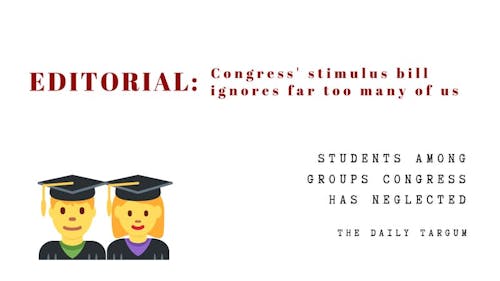EDITORIAL: Congress' stimulus bill ignores far too many of us

Congress has (and continues to) pass stimulus bills to curtail the economic damage that the coronavirus disease (COVID-19) pandemic has caused, as well as to mitigate future potential economic carnage.
The most recent — and by far the largest — stimulus bill provides the American economy with an astounding $2.2 trillion. But do not be fooled. That money is not going to be distributed in an egalitarian manner or even a relatively fair one.
Congress passed the bill at breakneck speed, with both parties rushing to pass it to shore up the then-dwindling (and still wildly volatile) stock market, and as a result, there are numerous oversights. As college students, this is concerning, because those blind spots directly harm many of us.
Dependents, even those older than age 18, do not get any money. Many — the vast majority of, actually — college students are dependents, meaning that their parents claim them on their tax filings. Boiled down, a dependent is exactly what it sounds like: someone who depends on somebody else for the majority of their financial support.
“You can’t get a payment if someone claims you as a dependent, even if you’re an adult. In any given family and in most instances, everyone must have a valid Social Security number in order to be eligible,” according to The New York Times.
But, as that same article details, parents with dependents younger than the age of 16 are eligible for additional payment.
What we have here is a massive oversight of our age group. In theory, yes, giving money to dependents may seem unnecessary (as they do not pay for much of their life infrastructure), but a nuanced look at things undermines that notion. A college dependent who takes out a loan is, as a matter of fact, paying for their schooling — just at a later date. That includes housing, food in addition to education. They are not truly depending on anyone but their future selves.
It also shows the inconsistency of the bill in general. Why do only dependents younger than the age of 16 warrant additional money from the government? The philosophy Congress has undertaken is that dependents older than that age are more self-sufficient and therefore are not reason enough to provide additional stimulus cash.
But, if those older dependents are supporting themselves somewhat — which the government concedes by not paying parents who have such dependents — then why are they not eligible for the rebate?
College students work as well. College students are also losing work. By ignoring the valid struggles that we face, the government has left us all to suffer far more than necessary.
College students are only one of many groups to be neglected by this rushed bill. What happens to people with “dependents” who are elderly? They are also incurring greater costs during this crisis, but the government’s inability to see past the nuclear family and "traditional" living arrangements has marginalized those who do not live in the perceived “standard situation.”
But we cannot be surprised that we are neglected in this bill. As this year’s Democratic primaries have shown us, young people do not voice their opinions via the ballot enough to capture the attention and sympathies of the government.
While it is upsetting that Congress does not intrinsically care for us, which they should as public servants, we must leverage the power of our votes if we want future provisions to aid our age group.
If we vote in politicians who care for us and understand the issues facing our age group, our needs will be reflected in future legislation, unlike right now.
When more stimulus bills are passed in the coming months, which is inevitable, the government must consider our needs and repair the blatant oversight perpetrated by this stimulus.
Other large institutions, not solely the government, must aid college students as well, and that starts with Rutgers. Students who work on-campus jobs should continue to be compensated during this time of hardship, and Rutgers should also reimburse students in-part for their tuition expenses.
And for those who do want to help out — and have the privilege of doing so — there are plenty of organizations that help those in need, which are particularly important during times of crisis. If you can help, help.
The Daily Targum's editorials represent the views of the majority of the 152nd editorial board. Columns, cartoons and letters do not necessarily reflect the views of the Targum Publishing Company or its staff.



